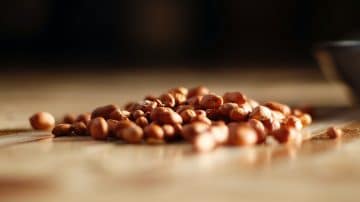Quick Facts About Peanut Water
| A | B |
|---|---|
| Identification | A liquid obtained from soaking raw peanuts in water for several hours |
| Origin | Traditional beverage consumed in some cultures, particularly West Africa |
| Nutritional Profile | Good source of vitamins, minerals, and antioxidants |
| Health Benefits | Boosts immunity, aids digestion, manages blood sugar levels, reduces inflammation |
| Extracted From | Peanut |
| Taste | Nutty flavor, slightly sweet |
| Usage | Hydration drink, treatment for coughs and colds, skin care |
| Safety | Peanut water is generally safe for most people when consumed in moderation |
| Precaution | Individuals with allergies to peanuts or tree nuts should avoid peanut water |
Common practice among some women is the use of peanut water for tightening the vagina, usually to help increase the sexual pleasure they derive during copulation or help their male sex partners feel their vaginal grip more. While this may seem harmless since peanut is a consumable, we cannot be sure of its safety, neither can we certify that it is effective.
Tightening the vagina is usually necessary when the muscular floor of the pelvis has become loose. This mostly happens after childbirth but happens to different extent in different women. The pelvic floor muscles give the vagina strong grip and elasticity, improving the sexual experience of both male and female sex partners. The more the pelvic floor muscles lose their elasticity, the more the vagina becomes open, and most women consider this undesirable.
In this article, we will talk about the efficacy of using peanut water for tightening the vagina. We will also look at the safety of using this vagina tightening method compared to other scientifically proven means of strengthening the pelvic floor muscles. Ultimately, we will be able to confirm if using peanut water for tightening the vagina hold true or not.
Vagina Tightening
Vagina tightening will not be an exercise that women are interested in if they understand that the vagina is elastic and contracts and relaxes, just as a rubber band does. The vagina does not lose its elasticity as a result of penetration of different penis sizes in the vagina. Although it changes with age and childbirth, it does not become “loose”.
The term “Loose Vagina” is used to shame women who supposedly have numerous sex partners, insinuating that the more sex partners they have, the more frequently they engage in sexual intercourse, and consequently, the wider and loose their vagina is, making it undesirable or not enjoyable.
To escape the stigma of being called a loose vagina, some women resort to looking for means to make their vagina tighter, while those who seem to have really tight vagina may feel they have the best vagina any lady can have. In reality, an abnormally tight vagina, even after arousal and during sex, points to vaginal muscles that are not relax, which may be as a result of a medical condition called Vaginismus.
There are many methods women employ to tighten the vagina muscles. Some give desired result, but moistly, they only last for a short time. Therefore, they have to repeatedly apply these treatments, which in the long run, may cause more damage to the vagina than what they initially had.
Causes of Vaginal Loosening
The vagina is naturally elastic and returns to its natural state and size after some period of rest from use. Although it can be compared to a rubber band in its elasticity, but because of its biological nature, it does not loose that elasticity as easily as a rubber band does. The vagina can become loose due to some reasons, and they include:
Childbirth
The major cause of vaginal loosening is childbirth. It involves the stretching of the vaginal muscles and walls to help bring a new life into the world. Usually, one vaginal birth may cause the vagina to feel loose but it soon returns to the right size after some time of exercising and following the right diet. However, numerous vaginal births may cause the vaginal to have some difficulty in returning to its actual original size. This is because every elastic material has a stretch limit, and although they may recover when stretched to this limit once, it becomes increasingly difficult to do so on repetition.
Related Article: Is Locust Beans Good for Pregnancy?
This does not mean the vagina will lose its elastic integrity and not stretch and contract anymore, it will. However, it will lose some elasticity and may not be as tight as it used to.
Age
As one ages, the body is not what it used to be. In association with the vagina, the female human body may begin to reduce the amount estrogen it produces, directly affecting the bulkiness, wetness, pH, and elasticity of the vagina.
As you approach your 40s, your vagina’s elasticity starts to reduce due to decreased estrogen presence. Also, you may notice that your vagina gets thinner, and you don’t get as lubricated as you used to. These are signs of the perimenopausal stage in a woman’s life, and it is normal. While they may seem subtle at this age, as your years get advanced, you begin to notice them more.
Remedies for Loose Vagina
There are many remedies for tightening loose vagina. Some of them are considered safe and effective while experts are not sure about others. Here are some of the remedies for tightening loose vagina.
Peanut Water for Tightening the Vagina
The common peanut has been in the news for some reasons other than their nutritional benefit. On social media, you must have come across posts that swear on the efficacy of using peanut water to tighten the vagina. While some people claim it works, female sexual health experts are outrightly against it, mainly because there are no scientific proofs to its efficacy or safety.

According to the social media posts, all you need to do is boil some peanut in water, strain the water from the peanut, and let it cool. Drink the water for some days (they recommend 5 days), and see how tight your vagina becomes.
There is no proof that there is a particular nutrient or phytochemical that ensures the tightening of the vagina muscles, neither is there any confirmation from any medical expert as to the possibility of this being effective.
To cap it off, we know that peanut is a good protein source and muscles need protein to grow. However, heat destroys protein easily, and subjecting peanut to heat for about 45 minutes, means the protein that may help in the vaginal muscle growth may have been denatured.
Therefore, our verdict is that the use of peanut water for tightening the vagina is bogus and another means to get people to spend their money on unnecessary things. Also, it gets people to expose themselves to unnecessary health risks.
Kegel's Exercises for Tightening Vagina
One of the recommended methods of tightening the vagina is by doing pelvic floor exercises called Kegel's. They help to increase the strength and firmness of the vaginal muscles, making the vagina become tighter. They are usually recommended for women who have had multiple vaginal births or weakened pelvic muscles as a result of cesarean section. It is safe and effective.
Conclusion
The vagina is an elastic organ that returns to its normal size when given some recovery time, just like other muscle parts in the body. However, vaginal childbirth and age may cause the vagina to lose some of its elasticity. To make the vagina tight again, the recommended method is to engage in Kegels.
Peanut water for tightening the vagina is an unsafe and ineffective method spread by non-professionals on social media.



